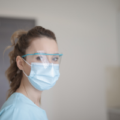BOHS releases simple ventilation guidance to reduce COVID risk at work
The British Occupational Hygiene Society, a scientific charity and the Chartered Society for Worker Health Protection has released a set of frequently asked questions on ventilation and COVID-19. This follows the delay of easing of lockdown measures in England which will require continued vigilance by employers and changes in the weather which affect considerations of ventilation.
The guidance, in the form of Frequently Asked Questions, aimed at a non-specialist audience is available on the Society’s COVID-19 hub, alongside guidance on managing COVID risk in different sectors and guidance on managing other health risks, such as legionella, as the economy opens up.
Speaking on behalf of the Society, BOHS President, Alison Margary commented, “We continue to get asked about how ventilation can be used to manage workplace risk of infection. Obviously, social distancing is the most effective protection against infection, but that is not always going to be possible. We have worked with scientists and ventilation engineering experts to provide some clear information for non-specialists who may be trying to keep their workforce cool and comfortable, but who also need to protect them against the risk of infection.”
“The risk of death and hospitalisation is greatly reduced by the vaccination programme, but nobody wants to get ill or have teams self-isolating,” she added.
The information, which deals with a range of issues from toilet ventilation to the use of air purifiers is drawn from the latest scientific knowledge and industry practice. It provides a first step in the use of general ventilation which has not been seen as an important control measure for worker health protection in the past.
Indeed, the Society is aware that the drive for fuel efficiency and lower carbon footprints has resulted in many office spaces which have limited options in relation to fresh air ventilation. Indoor air quality beyond COVID-19 is likely to gain more focus as people become more aware of the impact of the workplace on respiratory health.
“The COVID-19 crisis has highlighted that people are not getting fresh air in the workplace and that can have lasting and serious health effects,” commented CEO, Professor Kevin Bampton. “It has also highlighted that many employers do not understand how their ventilation systems work and neither do many commercial landlords. There is excellent expert guidance available, but this is a complex area. There are also a number of firms who are taking advantage of this and are selling unnecessary or ineffective systems to businesses, claiming to clean air. We would advise all businesses to get the advice of a competent expert, such as an occupational hygienist, before committing to such approaches.”



